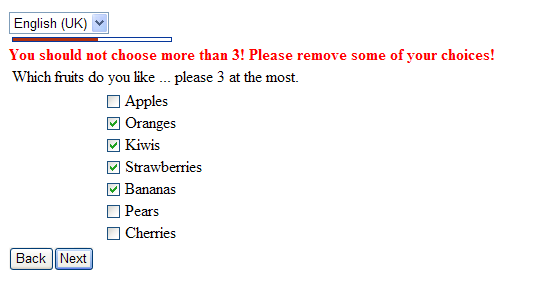More actions
No edit summary |
No edit summary |
||
| Line 1: | Line 1: | ||
| | ||
Property name: Max. answers required text | Property name: Max. answers required text | ||
< | |||
{| width="1019" cellspacing="0" cellpadding="2" border="0" style="border-collapse:collapse" class="tableintopic" | |||
|- | |||
| width="210" height="0" | | |||
| width="808" height="0" | | |||
|- align="left" valign="top" | |||
| width="1019" colspan="2" style="border:1px solid #010101;" | | |||
'''Property name: Max. answers required text''' | |||
|- align="left" valign="top" | |||
| width="210" style="border:1px solid #010101;" | | |||
Question types applied | |||
| width="809" style="border:1px solid #010101;" | | |||
Multi question and Open question | |||
|- align="left" valign="top" | |||
| width="210" style="border:1px solid #010101;" | | |||
Description | |||
| width="809" style="border:1px solid #010101;" | | |||
The text in this property will be displayed when the respondent does not select at the most the number of answer options specified in the maximum property of a question. | |||
|- align="left" valign="top" | |||
| width="210" style="border:1px solid #010101;" | | |||
Business logic | |||
| width="809" style="border:1px solid #010101;" | | |||
This property exists for both questionnaire and question properties. If set in a question property it will overrule the property of the questionnaire. If there is no value for this property in a question, its value will be inherited from the questionnaire property. | |||
The 'Max. answers required text' property of a question is not used when no 'Maximum' property is specified for the question. | |||
If there is no value for this property, the default value is: “Please choose a maximum of [[X]] options from the list.” where [[X]] is the value in the Maximum property of the question. | |||
|- align="left" valign="top" | |||
| width="210" style="border:1px solid #010101;" | | |||
Formatting | |||
| width="809" style="border:1px solid #010101;" | | |||
Text | |||
|- align="left" valign="top" | |||
| width="210" style="border:1px solid #010101;" | | |||
Screen examples | |||
| width="809" style="border:1px solid #010101;" | | |||
To set this text for either questionnaire or question you need to find this setting in the drop down list on top of the text area in the properties dialog. | |||
[[Image:3455.png]]<br> | |||
As shown above you can then insert a text that you find appropriate. | |||
The inserted text will then be used should the user have chosen more than the maximum allowed number of answer options. An example of this is shown below. | |||
[[Image:3456.png]]<br> | |||
|} | |||
[[Category:Language_dependent_properties]] | [[Category:Language_dependent_properties]] | ||
Latest revision as of 08:52, 21 December 2011
Property name: Max. answers required text
|
Property name: Max. answers required text | |
|
Question types applied |
Multi question and Open question |
|
Description |
The text in this property will be displayed when the respondent does not select at the most the number of answer options specified in the maximum property of a question. |
|
Business logic |
This property exists for both questionnaire and question properties. If set in a question property it will overrule the property of the questionnaire. If there is no value for this property in a question, its value will be inherited from the questionnaire property. The 'Max. answers required text' property of a question is not used when no 'Maximum' property is specified for the question. If there is no value for this property, the default value is: “Please choose a maximum of X options from the list.” where X is the value in the Maximum property of the question. |
|
Formatting |
Text |
|
Screen examples |
To set this text for either questionnaire or question you need to find this setting in the drop down list on top of the text area in the properties dialog. As shown above you can then insert a text that you find appropriate. The inserted text will then be used should the user have chosen more than the maximum allowed number of answer options. An example of this is shown below. |


